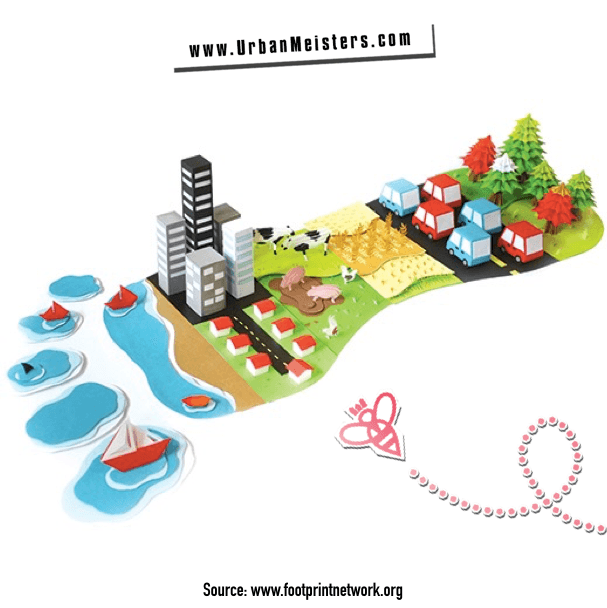Readers, we welcome our guest writer Joe Thomas for the second time on UrbanMeisters.com as he explains how modern lifestyle and industry are taking a toll on our environment. After his first piece on how plastic harms the planet, Joe explains how our way of life is setting in motion far greater consequences- a fact that we tend to forget in the grind of urban life.
Yes it’s a long read but totally worth your time.
Over to Joe Thomas.

A Reality Check
In the time that it has taken you to read this sentence, you have fallen through an eternal expanse of stars at approximately 460 metres a second. Clinging to a green and blue ball of rock awash in this endless sea, one could easily be forgiven for feeling very small and insignificant next to the enormity of existence. But despite the seemingly unyielding permanence of it all, our place within the cosmic scheme has never been under greater threat.
In our ever ambitious bid to become the masters of the world around us, our dependence on plundering the riches of the planet has in fact done the opposite and made us slaves to its bounty, addicts who are incapable of sating our desire for resources that once consumed are never coming back. Whilst political bodies across the world have all too slowly come to realise this and come to various agreements to reverse the damage wreaked on the environment, the wheels of industry all too often have no such conscience.
Modern Lifestyle: Extracting our pound of flesh
DEFORESTATION
Take the rainforests of Asia and South America for instance. Applying industrial scale methods, companies around the world have turned their attention to Earth’s largest expanses of greenery. Loggers, farmers, land developers- too many of each fail to see that the rainforests themselves are of more value in their natural state than as land to be built on. Each year on average, approximately 46-58 thousand square miles / 120-150 square kilometer of forest is consumed. Not only does this compromise the habitat of the local wildlife, but gone is another source of valuable natural extracts. These help to make up the medicines that we take for granted every day, from cough medicine to aspirin. You might be able to afford the priciest champagne through cutting down the rainforest, but how worth will it be when there’s no more hangover cures the next day?
Indeed, such short-sighted thinking has already had a devastating effect on the human population close by. Time and again, the large scale removal of vegetation has left local residents at the mercy of torrential rains that once would have been soaked up by the roots that have now been uprooted. Mere collateral damage of modern lifestyle?
Simple steps you can take:
- Plant a tree and if everyone did a billions of trees would be introduced back into the world
- Go paperless, with the digital world and inventions it’s easy
- Buy recycled goods, and recycle yourself
- Eat a plant based diet
- Look for the FSC certificate on wood products
BIODIVERSITY
With the destruction of some of the world’s most delicate habitats, innumerable animal species are under threat. Whilst some may dismiss such an effect as ‘survival of the fittest’ or as a necessary sacrifice on the altar of progress, there is a far more practical benefit to biodiversity.
Like it or not, humans as advanced as we are still constituting part of a wider system of interlocking species. Each one of us has our part to play and to compromise just a single member of this system has a knock on consequence for the rest.
It is estimated that we are losing around 50,000 species of animals, plants and microorganisms every year due to deforestation and this will have a hugely detrimental effect on the delicate balance of the ecosystem.
Marshland, wetlands and meadows are all disappearing as we expand our urban areas. In recent years there has been much concern over the dwindling bee population and their survival has a direct implication for us as they pollinate our crops and ensure our food supply.

OIL SPILLAGE
Speaking of untamed, the world’s great oceans seemingly stretch on forever to horizons always out of reach, encouraging adventure to further riches. And the new pirates are the ones in corporate suits.
Let’s take Gulf of Mexico, which although now 6 years later still suffers from the catastrophic damage wrought by the Deepwater Horizon oil spill. Across Mexico, South America, the Caribbean and the American states on the southern seaboard, polluted waters ruined the livelihoods of fishermen, tourist establishments that rely on the pristine seas and virtually every other business that is similarly dependent.
You ask what your role could be here?
The average person can hardly be held responsible for the flaws in the extraction process of crude oil. However, what we can do is make sure that such accidents become less likely to occur as less oil is needed due to a switch to renewable power sources.
As useful as oil is, it is becoming increasingly unnecessary to use for small-scale applications. All over the world, great leaps are being made to harness the natural energy all around us, wind, solar and tidal being but a few of the most prominent. Even within your home, you can install some kind of initiative that isn’t dependent on oil and even save yourself money in the long run through lower energy bills.
It’s not only oil spills, as due to the amount of chemicals from agriculture and industry which are being washed into the sea, our oceans now have a large number of dead zones. These dead zones are areas where the low level of oxygen in the water means that marine life can no longer be supported there. This isn’t helped by further gross overfishing that is bringing fish populations down to levels that sometimes can’t be replenished.
PLASTICS
We have explained earlier how dependent modern lifestyle is on plastic consumption and how bad it is for environment.
Here is a recap of things you can do to help:
- Stop buying bottled water
- Bring your own bags shopping and avoid plastic bags. Get into the habit of saying “no thank you, I do not need a bag”
- Refillable containers for hand soap, washing up liquid
- Tupperware for food
- Do not buy coffee cups, bring your own travel coffee mug, or in a café keep it ceramic
- Go for bulk buying
- Use silverware
- Seek items that are not plastic
WASTE
In an age of mass consumerism and globalisation, there are few easy ways for manufacturers to keep up with demand. With tech-giant Apple for example selling more IPhone’s in a day than there was people born in 24 hours, sustainable production methods are currently unsuitable to match such avarice. In the rush to always have the latest and most cutting edge models, we are overlooking the potential that exists in less flashy but just as functional alternatives. Nope our modern lifestyle does not allow it!
Indeed, this modern lifestyle culture of discarding what we have due too mere convenience has found its way into nearly everything we do. Even with perishable goods with a short lifespan such as food is no exemption, with developed countries on average throwing away 30-40% of all food purchased. This has cultivated a situation in which 30% of the world’s farmland is essentially wasted.
What can you do?
Thankfully, this is an issue which can easily be dealt with by the average person with minimal effort. Instead of buying regular brand food, consider going for a long-life alternative. It tastes the same and saves you having to yet another tedious shopping trip, so you really have everything to gain. Try and go zero waste like this awesome couple in Paris we featured some time ago.
VEHICLE EMISSIONS
Perhaps the most notorious candidate on this list, the hidden cost of vehicular travel is responsible for roughly 13% of carbon dioxide that is fuelling global warming. As can be seen in this staggering infographic, the number of cars and lorries ploughing the world’s roads is enormous, to the point that I can’t even type out the numbers as they shift before my eyes. That’s not even to mention the emissions from sea and air travel, as due to being the lifeblood of our trade, cutting back on the number of these vehicles is a difficult proposition.
Resultantly, this modern lifestyle issue is arguably the most difficult to fix on this list. Whilst millions do reduce their carbon footprint via public transport, for many more that simply isn’t a plausible possibility. I myself would have no hope in hell of making it to work in time without my car and with none of my colleagues living near enough to car pool, my options are strictly limited.
We have to optimise our options for a healthier environment. Lorries for instance don’t necessarily need to be gas guzzlers, when there is a range of measures transport firms can take at a minimal cost. Doing so not only reduces emissions, but increases fuel efficiency which in turn requires less spending on petrol.
Some other things you can do to help:
- Consider keeping travel down where possible, by using digital communication such as skype meetings and using the telephone
- Use public transport, walking and biking
- Try carpooling for long distances. It’s very easy and can work out much cheaper
- Keep acceleration smooth and non-rapid, then drive at a steady speed
- Avoid keeping the engine on when possible.
- Look for a fuel efficient car model
- Buy local produce: You may have heard about food miles. This is the distance your food has travelled before it reaches your plate. By buying local produce you help the local community and keep your carbon footprint down.
Green Modern Lifestyle is the way to go!
Whilst it may be a pipedream to expect 100% sustainable energy and industry overnight, this can be achieved through continued diligence and co-operation. Extensive research has been going on for years looking for that one big breakthrough to transform the world, but environmentalism is not the sole responsibility of a handful of scientists.
Rather than view green living as a burden, I would propose the opposite. Our green and blue rock has the potential to be our paradise or our prison, but the solutions are there to make things as we want it to be. We can have the resources and products we want in an inexhaustible amount, if we take steps now to make it happen. If a few small steps today are all that’s needed for us to counter the toll our modern lifestyle takes on environment then we should definitely be up for the challenge. Wouldn’t you agree?

![[ALERTE GREENWASHING – CHAMBRE ENFANT] Les conseils pratiques d’un père engagé](http://urbanmeisters.com/wp-content/uploads/bfi_thumb/dummy-transparent-pyhloyclal4p5ty8tb4matytlyd4xyugzcd2z17fr6.png)